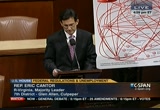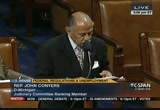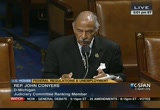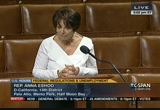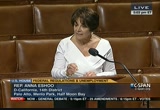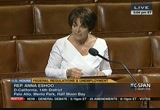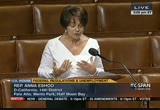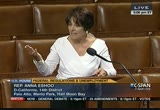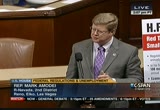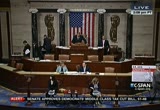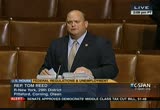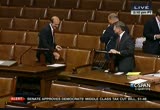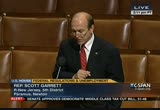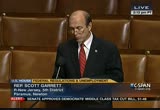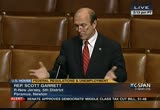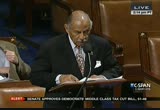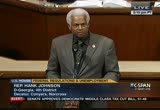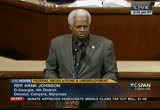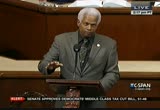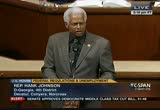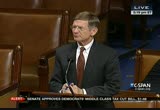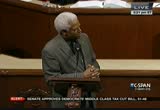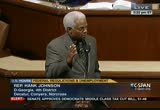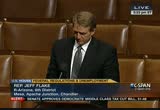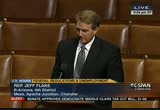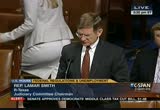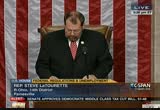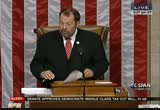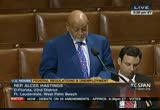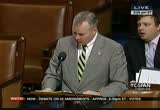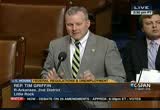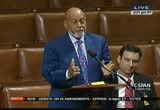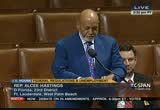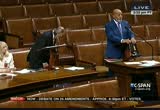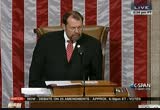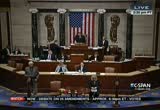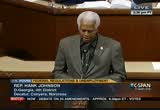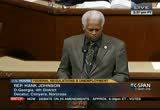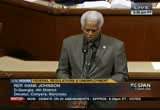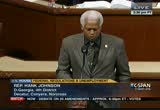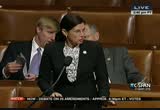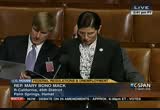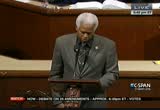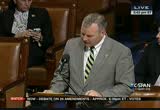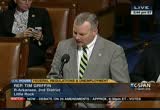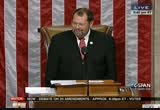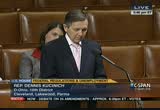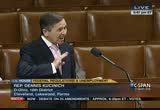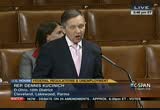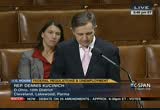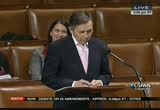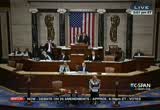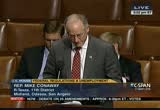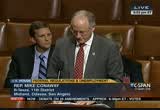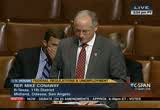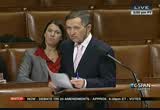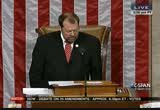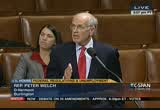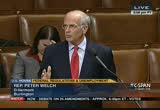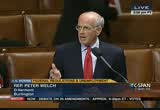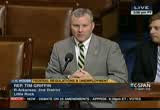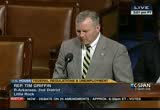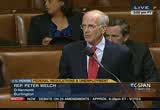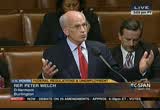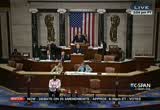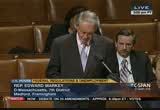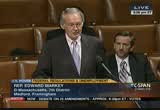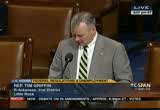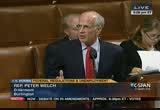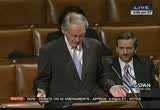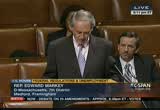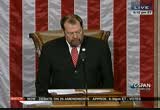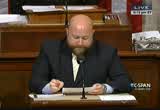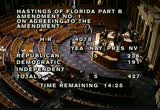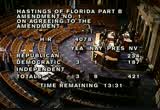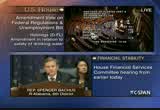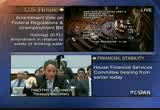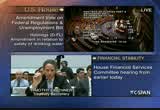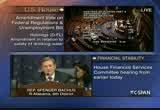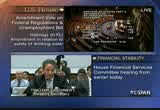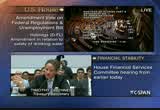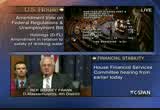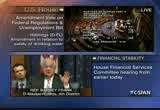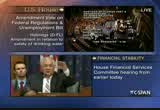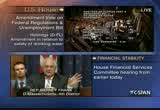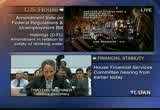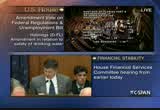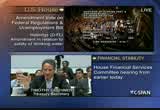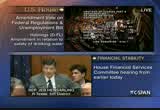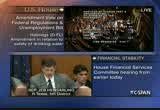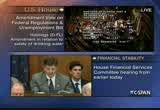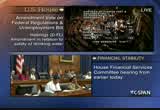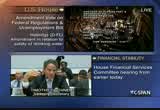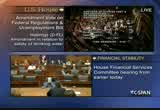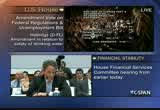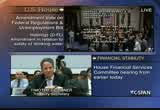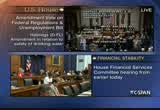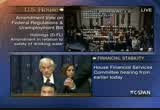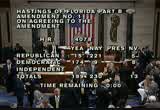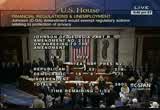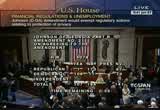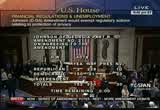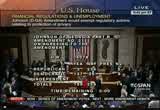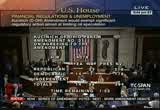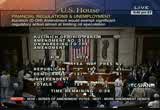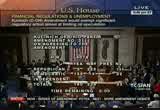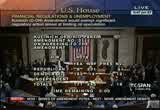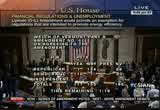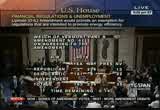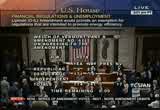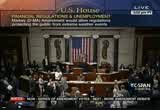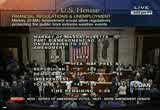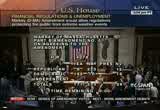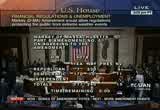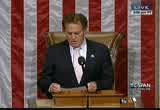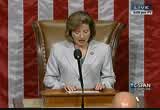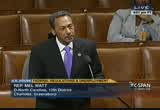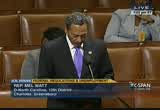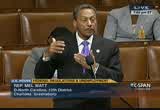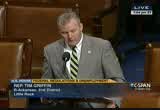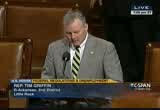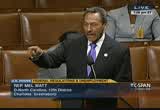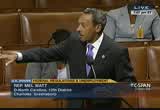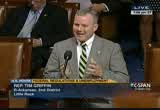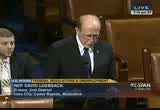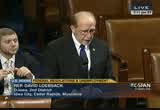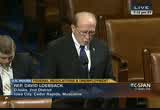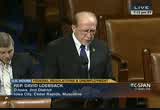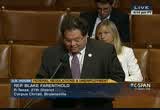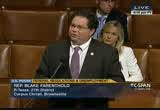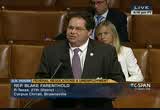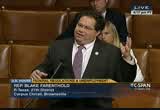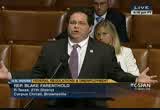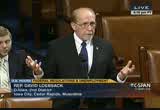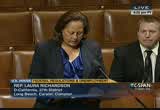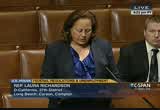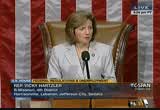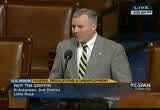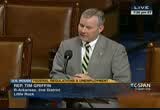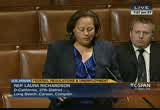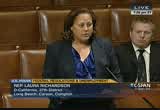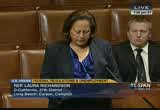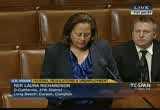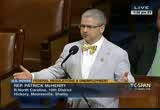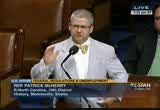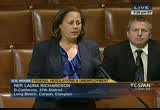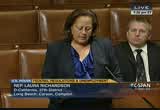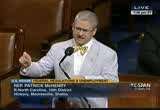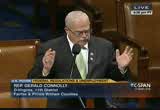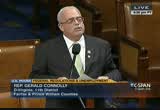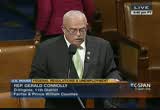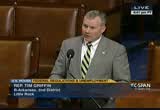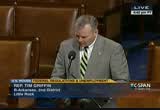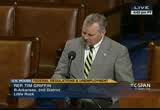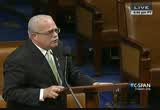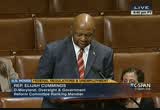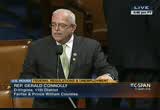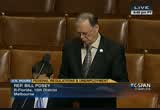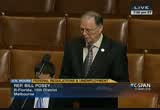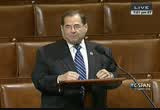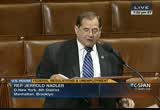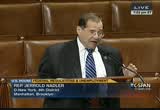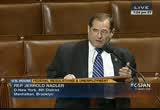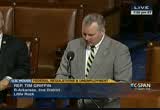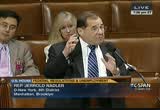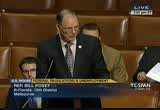tv U.S. House of Representatives CSPAN July 25, 2012 5:00pm-8:00pm EDT
5:00 pm
federal regulation must become smarter and less harmful to our economy. mr. chairman, we know small businesses are built because of the men and women who take risks, work hard, and invest capital and new ideas. and because it's just too hard for these small business owners to operate, we have brought this bill forward and that is why i urge my colleagues to support the passage of this legislation. i yield back. the chair: the gentleman from michigan. mr. conyers: mr. speaker, i yield myself such time as i may consume and i would like to just remark to the distinguished speaker on the republican side that the -- another republican has a completely different point of view who is the former chairman of the house committee on
5:01 pm
science for over five years, and that is sherwood boller, many of us remember him fondly, and he says that it would be, and i quote, difficult to exaggerate the sweep and destructiveness of the house bill. be and that is referring to 4078. direction the agencies that were created to protect the public to close up shop. and then he goes on to say, quote, there's no indication that this bill would have job growth. indeed, by blocking rules needed to make the economy run more smoothly, the bill could harm our economic prospects for years to come. and so i present to you a point
5:02 pm
of view of the republican leader of the house of representatives and a distinguished republican former chairman of the committee of science from 2001 to 2006. i now turn to ms. he shall auto of california -- eshoo of california, and i yield her as much time as she may desire. the chair: the gentlelady from california. ms. eshoo: mr. chairman, thank you, and to the distinguished ranking member and my friend, thank you for yielding time to me. i'm here today and i'm very troubled about this bill. instead of considering legislation today that would create jobs and stimulate economic growth, the house is going to take up and vote on a bill that does the exact
5:03 pm
opposite. in fact, it has enormous potential for delaying the implementation of new spectrum and public safety law. now, i don't know if you vetted your own effort, so to speak, but it was not all that long ago. it was earlier this year that congress passed and the president signed into law landmark legislation that implements a key recommendation of the 9/11 commission, and the legislation also made more spectrum available for mobile broadband services. now, this was the last recommendation that the 9/11 commission had made and congress finally made good on that recommendation. and that was to establish a nationwide interoperable public
5:04 pm
safety network. why? because on that faithful day in new york when police and fire went into those twin towers, their communication systems did not allow them to communicate with each other, to talk to each other. and we finally on a bipartisan basis resolved that. we've also at the time of the passage of that legislation, mr. chairman, we all praised the legislation and we described the billions of dollars in new investment as well as the hundreds of thousands of jobs that will be created as the result of the legislation, calling it an economic game changer. now the nonpartisan congressional budget office, the c.b.o.'s analysis of the bill that you've dragged to the floor today, 4078, and what we're considering suggests that
5:05 pm
this legislation could delay this critical investment and the job creation that comes with it. my rhetorical question to the majority is, do you even know what you're doing? i don't think the left hand knows what the right hand is doing. now, i offered an amendment at the rules committee which was not made in order that would have exempted the legislation, which i'm referring to, that any agency rulemaking that creates jobs or protects public safety, including the provisions of the middle-class tax relief and job creation act of 2012, that paid for the creation of a nationwide public safety broadband network through voluntary spectrum incentive auctions be exempt. that was not made order, so all i can do is come to the
5:06 pm
floor and use the voice that my constituents have entrusted to stand up for things that really makes sense for our country, bipartisan legislation which your legislation today really screws up, in plain english. so mr. chairman, would the auction of this prime spectrum expected to raise over $25 billion, passage of this legislation, h.r. 4078, will not only delay access to this critical revenue, on top of that you brought to the floor really bad policy. and that's why i urge my colleagues to vote no on final passage of this legislation because it messes up the good work that we were able to bring forward with really i think a
5:07 pm
political advertising message. this is not serious legislation. what's serious about it is the damage that it will do to legislation that we worked so hard on in a bipartisan basis to make law, and this is essentially comes behind it as the wrecking crew. so with it i thank the distinguished ranking member for allowing me time to come to the floor and express this and i yield back the balance of my time. the chair: the gentlelady yields back the balance of her time. the gentleman from texas. mr. smith: mr. chairman, i yield one minute to the gentleman from nevada, mr. amodei, who is a member of the judiciary committee. the chair: the gentleman from nevada for one minute. mr. amodei: thank you, mr. chairman. thank you, mr. chairman, for the time. i find it interesting that we're sitting here having a discussion about regulations in this context. i believe that it is the regulations that are the byproduct of this process that we engage here. it's called legislation.
5:08 pm
the regulatory process is not the fourth branch of government, that has no accountability to anyone and basically can do whatever the heck it darn well pleases. the agencies that we are talking about here today, none of which exist in the constitution, were created by this congress which means if we created you, we can darn well talk about the regulations that you provided. when i hear words like ideology, cynicism, really bad policy, what is the danger in predictability, for instance, in the timing of the regulatory process? there is nothing in this legislation which changes the substance of agency discretion in how they go about their business. what we're talking about here is the process, the process by which you go provide predict ict and stability of those trying to hire workers and things like that. i urge your support. i thank mr. griffin and mr. ross for their efforts in this area. i yield back. thank you, mr. chairman.
5:09 pm
the chair: the gentleman from michigan. mr. conyers: mr. chairman, i reserve at this time. the chair: the gentleman reserves. the gentleman from texas. mr. smith: mr. chairman, i yield 1 1/2 minutes to the gentleman from new york, mr. reed, who's a member of the ways and means committee. the chair: the gentleman from new york. mr. reed: i thank the former chairman on judiciary for yielding time to me. i rise today in support of h.r. 4078, mr. chairman, standing behind two weeks' worth of regulatory material produced in the federal register, which is the official record keeper of regulations here in washington, d.c. this represents the issue that we are talking about, mr. chairman. we need to stop sending this regulatory burden to our job creators back in the districts, back on the front lines that are creating the jobs of today and tomorrow. what we feed to stand for, and i believe there's a clear distinction between the two
5:10 pm
philosophies that are on display this afternoon in this chamber, the other side standing up for regulation, standing up for big government. i've come here as a firm believer in the private sector, in small business america, and we will stand for them day in and day out and this, mr. chairman, this pile of material, this pile of regulations is not good for our job creators. we can do better. we must do better for our children and grandchildren, and with that i ask support for h.r. 4078 and the corresponding long-term fix which will go a long way to take care of this problem and for perpetuity. thank you, mr. chairman. i yield back. the chair: the gentleman yields back. the gentleman from michigan. mr. conyers: mr. chairman, i continue to reserve. the chair: the gentleman reserves. the gentleman from texas. the gentleman from texas, mr. smith. the gentleman from michigan has reserved his time. mr. smith: mr. chairman, i yield three minutes to the gentleman from new jersey, mr. garrett, he's the vice chairman
5:11 pm
of the budget committee. the chair: the gentleman from new jersey for three minutes. mr. garrett: i thank you. i rise in support of h.r. 4078, the regulatory freeze and jobs act. at a time after regulation after new regulation is being proposed by the obama administration, it's critical that we restore some semblance of order in the regulatory process and ensure our small businesses don't continue down in a sea of red tape. so i thank you congressman griffin and chairman smith as well and chairman issa and leader cantor and the rules committee as well for including the s.e.c. as part of title 7. it subjects them to the president's executive order. what it does is inquire enhanced cost-benefit analysis requirements as well as require a review of existing regulation. title 6 will enhance the s.e.c. existing cost-benefit analysis by requiring the commission to first clearly identify a problem that would be addressed
5:12 pm
before issuing any new rules and the cost-benefit analysis be performed by the chief economist. while the s.e.c. has certain cost benefit requirements relative to rulemaking, in recent court decision remanded several of these rules and specifically pointed out deficiencies in the commission's use of cost-benefit analysis. for example, recently the s.e.c. inspector general issued a report that expressed several concerns he had about the quality of the s.e.c. cost-benefit analysis. it found absolutely none of the rulemaking he examined attempted to quantify either benefits or costs other than information collection costs. so this bill now will ensure that the benefits of any rulemaking outweigh the cost in both new and ex-- and both new and existing regulations are consistent, written in plain language and simply easy to understand. so title 6 also requires the s.e.c. to assess the cost and
5:13 pm
benefit regulatory alternatives, including the alternative to simply not regulating and choose the approach that maximizes the benefits. so under the bill the s.e.c. shall also evaluate if it's inconsistent, whether it's incompatible or duplicates other regulations as well. because some regulations have been politicized in the past, this bill will require the examinationing be done by the commission's chief economist. you know, these are really just commonsense reforms and are appropriate. especially given the fact the commission continues to struggle with this issue. for instance, the d.c. court of appeals, which vacated the proxy access rule, they are the -- the court said this, the commission acted arbitrarily and capriciously for having failed again to assess the economic affects of these rules and framed the cost and benefits of the rules. so, mr. speaker, this bill also includes a new section adopted
5:14 pm
by the subcommittee to provide a clear postimplementation assessment of all new regulations so that these postimplementation cost-benefit analysis in addition to pre ones will be done correctly. finally, the commonsense approach, it's a pragmatic approach to the rulemaking process and i support the underlying legislation. the chair: the gentleman's time has expired. the gentleman from michigan. mr. conyers: mr. chairman, how much time remains? the chair: the gentleman from michigan has 5 1/2 minutes and the gentleman from texas has five. mr. conyers: at this time, i would yield to the distinguished the gentleman from atlanta, georgia, mr. hank johnson, a member of the judiciary
5:15 pm
committee as much time as he may consume for his statement. the chair: the gentleman from georgia. mr. johnson: mr. speaker, i rise today in opposition to h.r. 4078, the so-called red tape reduction and small business job creation act. this mother of all anti-regulation bills is actually a repackaging of a noxious bill that would make it impossible for the executive branch and its agencies to protect the american public. this bill would block the issuance of regulations regardless of how vital they are to safeguarding the public's health. they want to eliminate regulations that keep our workers safe and which would
5:16 pm
rein the excesses of wall street. why? so they can please their crony capitalist brothers, the koch brothers, and also the crony capitalist friends in the u.s. chamber of commerce and want to keep them happy. instead of creating jobs, the tea party republicans are assaulting the very regulations that ensure that we have clean air to breathe and clean water to drink. regulations that protect our children from unsafe products like toys, like clothing and bedding, baby food. regulations that protect seniors from adulter ated medicines and
5:17 pm
unsafe substances that they use. they essentially want to create so many barriers and obstacles to the promulgation of regulations that it's virtually impossible to do so. and so they want to keep these federal agencies from doing their job, which is to protect the health, safety and well-being of the people of this country. this isn't red tape reduction, folks. this is a philosophy of putting profits over people. the house is in session for six more days prior to our august break. and then after that, we have maybe about 10 legislative days before the end of the year. what have we accomplished in this congress -- bills like this
5:18 pm
and we voted to rescind and repeal obamacare over and over again. we are now up to number 34 votes on that. but what we have pending here is we have the bush tax cuts which we all agree that we should keep in place for the middle class. but because we don't agree to extend them for the koch brothers and the other crony capitalists that this party represents, they are not willing to get that done. they don't want to do the payroll tax cuts, the tax extenders, the a.m.t. patch, unemployment benefits, the doc fix, sequestration. all of this remains to be wrapped up within the next 10 days or so, plus six.
5:19 pm
the next two weeks of legislative activity. and so to think that this legislation would be effective in bringing reasonable regulations through this congress is absurd. we should be creating jobs legislatively. we should be helping veterans adjust to civilian life. we should be taking measures to impact the ongoing taking of homes of individuals in forecast -- foreclosure. so much we should be doing instead of helping our crony capitalist friends. i urge my colleagues to oppose this fundamentally flawed bill and i yield back. the chair: the gentleman yields back the balance of his time. the gentleman from texas.
5:20 pm
mr. smith: i yield two minutes to the gentleman from georgia, mr. woodal. the chair: the gentleman from georgia. mr. woodall: i'm pleased to come to the floor. we share a common border and common ground but i have to tell you that he could not be more wrong today, because this bill does one thing and one thing and that is to say that whatever it is that the people's house decides whatever it is that the people's congress decides and the executive branch for implementation that it come right back here at the end if that's big, it comes right back here so we confirm that they got it right. as i listen to my friend's words, mr. chairman, i might believe that something a republican congress was doing to a democratic administration. but i dare say what is so
5:21 pm
important what the work the chairman is doing isn't about a democratic house and republican administration, but good oversight for a republican administration and republican house and good oversight for a democratic house and democratic administration. i say to my friend, he is absolutely right about all the work we have to get done this year, but the oversight that we do, the oversight is so important. and i would say, mr. chairman, i believe my friends on the democratic side of the aisle fell short in that respect over a democratic administration and i'm certain my friends on the republican side of the aisle fell short on the republican administration. and i hope that my friend from georgia is going to join me in that effort and i would be happy to yield. mr. johnson: i really enjoy the fact that we share a common border and we have worked together to try to traverse that
5:22 pm
border and come to consensus on issues. and that is exactly what this congress should be about, but unfortunately due an obstructionist strategy, we have not been successful and it's because of that, i know we would not be able to handle the regulations -- the chair: the gentleman's time has expired. the gentleman from michigan has 45 seconds. mr. conyers: i yield the 45 seconds to the gentleman from georgia. the chair: the gentleman from georgia for 45 seconds. mr. johnson: mr. speaker, there is absolutely no way that with the many regulations that we could be promulgating and put into effect that we would be able to do that here in congress instead of letting the stake
5:23 pm
holders, the business community and the regulatory agencies work things out. there's no way that we're going to be able to handle that in congress. mr. woodall: would the gentleman yield? there is not one regulation that this congress would send to the executive branch that you and i would not come together -- mr. johnson: we would not be able to come to agreement. and i yield back. the chair: all time controlled by mr. conyers has expired. and the gentleman from texas has three minutes. mr. smith: i yield two minutes to mr. flake. the chair: the gentleman from arizona. mr. flake: i rise in support of this act -- this legislation would provide important regulatory reforms and couldn't come at a better time for the economy. in particular, i'm pleased to support my colleague, congressman quayle's sunshine
5:24 pm
for regulatory decree and settlements act. in the west, we have seen the e.p.a. adopt what appears to be a strategy that is contemplated with respect to the implementation of the clean air act. this includes ignoring submitted state plans, inviting lawsuits from nongovernmental organizations and then agreeing to consent decrees that result in federal intervention. while this raises a host of issues, it tramples on states' per og georgiatives and flies in the face of congress to let the states lead when it comes to air quality decisions. e.p.a. has previously flatly ignored the states' submitted plans for dealing with regional haze and agreed to a consent decree without consulting the arizona department of environmental quality that would result in a federally driven and
5:25 pm
needlessly costly outcome that is not beneficial to arizona's residents. while arizona has sued to be allowed to intervene, it is likely this scenario would not have played out, had this legislation been in place. i urge my colleagues to support this legislation and in doing so support congress' intent that the states lead when it comes to air quality planning. and i yield back. the chair: the gentleman yields back the balance of his time. the gentleman from texas. mr. smith: i yield myself the ball aps of my time. the chair: the gentleman is recognized. mr. smith: mr. chairman, job creation is the key to economic recovery, but overregulation kills jobs and burdens small businesses, which are america's main job generators. the red tape reduction and small business job creation act offers many commonsense bipartisan solutions to the problem of overregulation.
5:26 pm
like the regulatory flexibility improvements account and the re inch ns act, the bill offers more commonsense bipartisan solutions to protect small businesses from even more wasteful job-killing regulations and red tape. mr. chairman, i urge my colleagues to support this legislation and i look forward to its passage. the chair: all time for general debate has expired. pursuant to the rule the bill shall be considered for amendment. in lieu of the amendments in the nature of a substitute, an amendment in the nature of a substitute consisting the tks of the rules committee print 112-28, modified by the amendment printed in part a of house report 112-616, is adopted and the bill as amended shall be considered as the original bill for the purpose of further amendment under the five-minute rule and shall be considered as read. no further amendments to the
5:27 pm
bill as amended shall be in order except those printed in part b of house report 112-616. each such further amendment may be offered only in the order printed in the report by a member designated in the report shall be considered read and debatable for the time speaks fide in the report controlled by a proponent and opponent and shall be not subject to amendment and not be subject to demand for division of the question. it is now in order to consider amendment number 1 printed in part b of house report 112-616. for what purpose does the gentleman from florida, mr. hastings, seek recognition? mr. hastings: i have an amendment at the desk. the chair: the clerk will designate the amendment. the clerk: amendment number 1 printed in part b of house report 112-616 offered by mr. hastings of florida. the chair: pursuant to house resolution 738, the gentleman from florida, mr. hastings, and a member opposed each will
5:28 pm
control five minutes and the chair recognizes the gentleman from florida. mr. hastings: thank you very much, mr. chairman. i'm pleased to introduce this amendment to help ensure clean drinking water. this measure amends h.r. 4078, the regulatory act by exempting the moratorium, regulations that ensure drinking water is safe. safe drinking water is essential to public health. there's a long and terrible history of polluters dumping all manner of toxins into rivers, streams and other sources of drinking water. aside from the environmental destruction, it costs an enormous amount to effectively clean such sources once they have been polluted. it costs even more to provide the necessary medical care for persons made sick by exposure to
5:29 pm
polluted water. we cannot afford to weaken or delay critical agency action designed to ensure the continued enforcement and regulation of clean water rules. this is not about creating jobs. polluting water doesn't create more jobs, but it does negatively impact public health. we must remain vigilant in protecting our water supply and i urge my colleagues to vote in favor of this amendment. and i reserve the balance of my time. the chair: the gentleman reserves the balance of his time. for what purpose does gentleman rise? >> i rise in opposition to the amendment. the chair: the gentleman is recognized for five minutes. >> this amendment is unnecessary and weakens the important reforms made by the bill. this administration has been issuing expensive regulations, each of which cost the economy
5:30 pm
over $100 million. according to a study by the heritage foundation president obama has adopted 106 regulations that add $46 byion in annual regulatory costs to the private sector and $11 billion in one-time implementation costs. in contrast in his first three years in office, president bush adopted 28 major regulations costing the private sector $8 billion annually. the bill is designed only to prevent unnecessary regulations. titles 1 and 2 allow the president for regulations that are necessary for health and emergencies. and the waiver of title 1 allows the president to authorize regulations during the moratorium period with the permission of congress. . . regulation that the president
5:31 pm
wants enacted simply have to go through congress. balance of power. title 3 prevents agencies from using litigation with special interest groups to force more regulations on the economy without sufficient transparency, public participation and judicial scrutiny. for too long, agencies have used consent decrees and settlement agreements as cover to promulgate regulations with less time for review of cost and benefits, alternatives and public comments. this is yet another way that agencies impose unnecessary and ill-considered regulations on the public. it should be stopped. for these reasons i oppose the amendment. i reserve the balance of my time. the chair: the gentleman reserves the balance of his time. the gentleman from florida. mr. hastings: mr. speaker, i yield myself such time as i may consume or the balance of the time in light of the fact i don't think anyone else is
5:32 pm
going to speak on this amendment. i clearly understand my colleague's position as set forth. the one thing i cannot abide and offer by way of constructive criticism is the fact that all over this nation too often we find that polluters cause our streams, rivers and waters to be damaged. i'm a fifth generation floridian, and i heard the gentleman in the rules committee and on the floor today speaking pridefully and rightfully about his children. i've seen the damage in florida, and i've seen much of the damage that's been done around the nation. while it is true that the legislation as offered would allow for the president to come to congress for approval, by
5:33 pm
the time congress gets through doing anything, the pollution that we are trying to avoid may very well have overtaken us. we have a very fragile ecosystem in our country, and as it pertains to water it would just be absurd to not address it immediately. i am pleased to yield time to the gentleman from michigan. mr. conyers: i thank the author of this amendment because it highlights the dangers of this bill. and surely if there's anything that reprioritizes in our whole ecosystem is the value of clean water over profits. i'm astounded that anyone would oppose the amendment, frankly.
5:34 pm
mr. hastings: thank you very much, mr. chairman. with that i yield back the balance of my time. the chair: the gentleman yields back the balance of his time. the gentleman from arkansas. mr. griffin: i yield myself such time as i may consume. the chair: the gentleman is recognized. mr. griffin: i would just like to make it clear again that any regulations that are needed that the gentleman from florida feels are needed, the president feels are needed, those can be enacted under this law. it simply requires congress to play a role. and i have no doubt that the president opposes this bill. i understand that he doesn't want to share his regulatory power with this body. i'm sure a lot of presidents might feel that way, but it's about separation of powers and sharing power and allowing this body to have a say. i yield back. the chair: the question is on the amendment offered by the
5:35 pm
gentleman from florida, mr. hastings. those in favor say aye. those opposed, no. in the opinion of the chair, the noes have it. the gentleman from florida. mr. hastings: i ask for the yeas and nays. the chair: does the gentleman ask for a recorded vote? mr. hastings: recorded vote. the chair: pursuant to clause 6 of rule 18, further proceedings on the amendment offered by florida -- the gentleman from florida will be postponed. it is now in order to consider amendment number 2 printed in part b of house report 112-616. and for what purposes does the gentleman from georgia rise? mr. johnson: i am the designee of mr. conyers -- congressman conyers' amendment. the chair: the clerk will designate the amendment. the clerk: amendment number 2 printed in part b of house report 112-616 offered by mr. johnson of georgia. the chair: pursuant to house resolution 738, the gentleman from georgia, mr. johnson, and a member opposed, will each
5:36 pm
control five minutes. and the chair recognizes the gentleman from georgia. mr. johnson: thank you, mr. speaker. my amendment would amend the bill's definition of, quote, significant regulatory action, end quote, to exclude any regulation or guidance that is intended to protect the privacy of americans. with the increasing opportunities for governmental and private organizations to obtain, maintain and disseminate sensitive private information on citizens, it is critical that we not prevent or delay the implementation of government regulations designed to protect the privacy of this information for several reasons. first, the government routinely collects almost every type of personal information about individuals and stores it in its databases. it may maintain this information for stated periods or permanently, and the
5:37 pm
government may share it with state agencies under certain circumstances. the concern, mr. speaker, is that such information has itself become a commodity with such financial value subjected to abuse for those that sell it for financial gain. the concern is that such information has itself become a commodity with financial value subject to abuse by those who would sell it for financial gain or for criminal purposes such as identity theft. unfortunately, several federal agencies, such as the veterans administration, have lost the personal information of millions of americans. for example, in 2006, the personal information for more than 26 million veterans and
5:38 pm
2.2 million current military service members was stolen from a department of veterans affairs employee's home after he had taken the data home without authorization. secondly, thanks to the largely unvetted use of social security numbers and the availability of other personally identifiable information through technological advances, data security breaches appear to be occurring with greater frequency. in government and the private sector, in both of those arenas we see these data breaches occurring. in turn, identity theft has swiftly evolved into one of the most prolific crimes in the united states. unregulated, those who have it would seek to sell it and abuse it, and there are businesses
5:39 pm
which exist with the purpose of collecting as much personal information as possible about individuals so that they can put together profiles that they can then sell. finally, the protection of americans' privacy is not a democratic or republican issue. indeed, it is one of the few that those on opposite ends of the political spectrum have long embraced. who can dispute the need to protect the privacy of patient's health information? the department of health and human services has been tasked by congress to implement new regulations to give patients more control over their own health records. in addition, h.h.s. is proposing new rules by protecting americans from discrimination based on their genetic information.
5:40 pm
yet, h.r. 4078 would stop these regulations from going into effect because the bill has only limited exceptions that would be generally inapplicable to privacy protection regulations. likewise, the bill's waiver provisions are generally unworkable. my amendment corrects this shortcoming and by including in the bill an exception for regulations -- excuse me -- an exception for regulations that protect the privacy of americans. and i would reserve the balance of my time. the chair: the gentleman reserves the balance of his time. for what purpose does the gentleman from arkansas rise? mr. griffin: i rise in opposition to this amendment, and i yield two minutes to the gentlewoman from california, mrs. bono mack. the chair: first of all, the gentleman is recognized for five minutes, and now the gentlelady from california is recognized.
5:41 pm
mrs. bono mack: thank you, mr. chairman. i thank the gentleman for yielding. i rise in strong opposition to this amendment offered relating to privacy regulations, midnight privacy rules and consent decrees. at a time when many of us are fighting attempts by the united nations to regulate the internet, lo and behold, some of us in congress would have us do the exact opposite. the congressiers amendment would have potentially job killing jobs on the internet. we don't need government to stifle internet freedom like china, russia. i've convened multiple hearings on online privacy and had hearings with stakeholders and there's one thing that absolutely everyone agrees on, don't mess up with a great thing. ecommerce has created jobs for americans and provides a tremendous boost to an otherwise stagnant economy. this amendment could put all of that success in jeopardy,
5:42 pm
stifling growth. i remind my colleagues that an agency can still promulgate rules on privacy so long as they are not considered significant as defined in the bill. but what we don't need is a system where dueling bureaucrats and the s.e.c. and f.c.c. have conflicting rules for consumers. while the amendment sounds as if it is narrowly tailored to exempt privacy regulations from the interim prohibitions on midnight rules, the term privacy is nonetheless undefined. that's the very definition of loophole and opens the back door to government intervention and regulation. soon, the house will consider my legislation telling the united states, russia, china and others to keep their hands off the internet. today, let's tell the united states that very same thing. i yield back. the chair: the gentlelady yields back the balance of her time. the gentleman from georgia has 30 seconds. mr. johnson: thank you, mr. speaker. this amendment is not designed to pave the way for any specific regulation. it's intended generally to prevent the day in issuing
5:43 pm
regulations that will protect the privacy of our citizens. privacy consideration should be at the forefront of our concerns, not treated as secondary inconvenience. whether or not a specific issue is one right for regulation is properly considered as part of the regulatory process which carefully considers all interests. to delay privacy regulations, as this bill would do, is to short-circuit the appropriately careful issuance of regulations needed to keep the personal behavior and personal information of our citizens safe from unwanted surveillance or exploitation, and i yield back. the chair: the gentleman from arkansas has three minutes. mr. griffin: i oppose this amendment, mr. chairman, because it is unnecessary. titles 1 and 2 of the bill, the regulatory freeze and midnight rules titles, apply only to those regulations that are most costly to the economy. costing $100 million or more.
5:44 pm
unfortunately, these are the kinds of rules that the obama administration is issuing at a much faster rate than the previous administration. under president bush, the office of information and regulatory affairs biannual regulatory agenda on average reported 77 economically significant regulations in the proposed and final stages of the rulemaking process. by comparison, president obama's biannual average is 124. i want to also note that president obama's office of information and regulatory affairs has not yet issued the spring, 2012, regulatory agenda. although judging by the weather alone, i'd say that spring is well behind us. this can only add to the regulatory uncertainty that discourages job creation. it's no wonder then that a gallup poll found small business owners cite complying
5:45 pm
with government regulations as their most important problem. the federal government needs to slow down on issuing the most costly regulations until the economy has a chance to recover or until this body approves regulations afforded to it. . even if it met the threshold for titles 1 and 2, the bill's waiver procedures would allow any necessary privacy regulation to move forward. there is no reason that regulations related to privacy should be exempt from the reforms to consent decree abuse contained in title 3. i oppose this amendment and yield back. the chair: the question is on the amendment offered by the gentleman from georgia, mr. johnson. those in favor say aye. those opposed, no. those opposed, no. in the pip of the chair, the
5:46 pm
noes appear to have it. the gentleman from georgia -- mr. johnson: i ask for a recorded vote. the chair: pursuant to clause 6 of rule 18, further proceedings on the amendment offered by the gentleman from from georgia will be postponed. it is now in order to consider amendment number 3 printed in part b of house report 112-616. for what purpose does the gentleman from ohio, mr. kucinich, rise? mr. kucinich: i have an amendment at the desk. the clerk: amendment number 3 printed in part b of house report of 12-616 offered by mr. kucinich initch of ohio. the chair: the gentleman from ohio, mr. kucinich and a member opposed each will control five minutes and the chair recognizes the gentleman from ohio. mr. kucinich: thank you very much, mr. chairman. i offer a sensible amendment to improve this bill. my amendment exempts from the
5:47 pm
moratorium any significant regulatory action that is specifically aimed at limiting speculation in the oil markets. now, think of a gas pump this way. if you look at a gas pump, has that nozzle, it is actually a hold-up device. every time our constituents pull up to the pump and say fill it up, the oil companies are saying stick them up. that's what's happening. so do we really want to tell these speculators and -- in oil markets that we don't have any interests in stopping their speculations? do we really want this bill to do that? because when we do that, what we are doing is giving the oil
5:48 pm
companies carte blanche to steal from our constituents. this is why i brought this amendment to help you. financial speculators have overwhelmed the commodity markets and driven market participants who seek to reduce their investments by making offsetting investments. excessive speculation in oil markets has come about as a result of the financialization of markets. that means commodities like oil are being set not by supply and demand but by financial concerns. financialization has increased volatility and prices in the futures market and inflated the price all of our constituents pay at the pump. stick them up and pay for products like heating oil. the financial crisis of 2008 was
5:49 pm
caused in part by commodity swaps, most of which are oil swaps. in july of 2008, traders pushed the price of a barrel of oil to $185. the applies fluctuation wasn't caused by supply and demand or events in the middle east. there was a worldwide recession in 2008. thanks to wall street, that's not the case. they find a way to make a profit at the expense of consumers and businesses. for decades, commercial hedges made up 70% of the commodity market and speculators making up 30%. now they make up about 70% and commercial hedges are 30%. do we really want to provide an opportunity for these speculators to cause our constituents to have to stick them up again -- could i ask how much time i have remaining?
5:50 pm
the chair: the gentleman has 2:45. mr. kucinich: i yield 45 seconds to my friend. mr. conyers: i may not need this much time. this is the most important provision in this bill if we can persuade our colleagues to accept it, because we've all been victims of this rising gas price and then they come down a little bit and then they start going back up again and then they come down. i congratulate the gentleman from ohio, mr. kucinich for introducing the amendment, and i'm proud, along with him to support consumers across this country. i thank the gentleman. mr. kucinich: how much more time would you like?
5:51 pm
i thank the gentleman. i thank you sincerely. the new england fuel institute published a list of 100 studies, 100 studies, my friends, sewing showing the impact of commodity speculation entitled evidence on the negative impact on commodity speculation by academics and public institutions. chairman, i ask unanimous consent to put this in the record. the chair: his request is covered under general leave. mr. kucinich: these studies show the harms in all commodity margets and not just oil. and regulatory agency to address oil speculation, excessive speculation hampers the proper function of all derivative markets, not just energy markets. the average price in america is $3.50. higher than it ought to be and that's because of excessive speculation. with that, i reserve the balance of my time.
5:52 pm
the chair: the gentleman reserves the balance of his time. for what purpose does the gentleman from texas rise? mr. conaway: rise in opposition to the gentleman's amendment. the chair: the gentleman is recognized. mr. conaway: i oppose the gentleman's amendment. this amendment that exempts any oil speculation and well intended and the federal government already has robust and effective enforcement efforts. in april of 2011 to senator cantwell, the federal trade commission wrote the commission established a number of processes to identify, investigate and if warranted prosecute illegal behavior in the energy industry. a full array of enforcement tools. after review, bureau of competition staff determined none of the complaints involved conduct that violated the market manipulation rules and in fact, cftc chairman summarized it in a january 13, 2011 statement
5:53 pm
during the open meeting on the proposed rule said we have been unable to find any reliable economic analysis to support either the conclusion that excessive speculation is affecting the markets we regulate. indeed, study after study has shown that excessive speculation has not been the problem that my colleague would argue. instead, almost every instance high prices can be traced back to market fundamentals. today's amendment, it isn't about excessive speculation. if it were, we would be talking about the speculators that brought the natural gas markets to an all-time low betting that our new found gas can be used. today's amendment is about finding fault and a scape goat with the problem of high gas prices that have been plaguing our constituents. i would like to know who is responsible, but the high price
5:54 pm
of oil is a problem of our own making. policy decisions were made years ago failing to open areas and slow-walking new infrastructure all contribute to today's pain at the pump. compounding these regulatory burdens is the long-term supply problem. while we have experienced recent production gains, those may not be enough to offset the demands of an expanding global economy as china and india and others continue to utilize and america shakes off the economic downturn, we need to keep pace with demand. oil producers in america have received -- have led to investment in new drilling technology in places like north dakota, pennsylvania and in texas. this investment has led to three straight years in increasing domestic production on private lands adding additional 120,000
5:55 pm
barrels a day in production last year. if the price is too high we shouldn't punish producers. we should open up supplies. efforts to blunt market signals by introducing regulations that make it harder to trade commodities may provide temporary relief but it will come at a cost. long-term artificially lowering prices will lead to less investment and supply shortages. the better way is to increase supply. oil prices will respond to increasing production. i urge my colleagues to oppose the amendment and not to waste any more taxpayer dollars. and i yield back. the chair: the gentleman yields back the balance of his time. the gentleman from ohio has 45 seconds. mr. kucinich: i want to say to my friend if the commodity futures trading commission isn't sure of the impact of
5:56 pm
speculation, i have 100 different studies here, 100 and if you like, if you have a budget for copying, we will bring it to them so they can see that speculation is undermining markets and consumers. also, none -- goldman sachs did a study and to translate their study, our constituents are paying 56 cents per gallon increase at the pump for speculation. stick them up? no. we have to make sure we hold the speculators to accountability and particularly in oil markets. i ask everyone to support this amendment, something we should be able to agree on on in bape basis. the chair: the question is on the amount offered by mr. kucinich initch. those in favor say aye. those opposed, no. in the opinion of the chair, the noes have it. the gentleman from ohio. mr. kucinich: i request a recorded vote. the chair: pursuant to clause 6,
5:57 pm
rule 18, further proceedings on the amendment offered by the gentleman from ohio will be postponed. it is now in order to consider amendment number 4 printed in part b of house report 112-616. for what purpose does the gentleman from vermont rise? mr. welch: mr. speaker, i have appear amendment at the desk. the chair: is the gentleman the designee of mr. lipinski? mr. welch: yes. the clerk: amendment number 4 printed in part b of house report 12-616 offered by mr. welch of vermont. the chair: the gentleman from vermont, mr. welch, and a member opposed will each control five minutes and the chair recognizes the gentleman from vermont. mr. welch: i preff ace my remarks by two things, not all regulations are good. it is a fair and appropriate question to examine whether regulations are useful or harmful.
5:58 pm
but second, not all regulations are bad. they can be useful, particularly in the area of energy efficiency. mr. speaker, we are having a contentious debate but we found one area where there is common agreement and that is less is more. any time -- whatever your fuel choice is, whether it's coal, nuclear, oil, solar, wind, using less means you save money. that's a good thing. regulations can play a very constructive role in helping those of us who participate in the economy. as individuals and as businesses to save money. my amendment would exempt from this overbroad bill, rules that would prohibit energy efficiency saving regulations. let me give a very good example of something that would happen detrimental to the economy if
5:59 pm
this bill is not amended. fuel standards were established in november. they have not yet gone into effect and would be prohibited from going into effect. the fuel economy standards for model years 2017 to 2025 will carry a vehicle fleet to an average fuel economy of 54.5 miles per gallon. the consumers support this and the industry supports this, the car industry supports this. and one of the reasons they do is if you have a rule that applies to all our manufacturers, that's the rule that they will manufacture their cars to. so you won't have gaming of this if you try to get some short-term advantage at the expense of the consumer, at the expense of the competitor. so energy efficiency is something that can help us save money. it can help the economy be more
6:00 pm
efficient. and in order to achieve the goal of energy efficiency, regulations reasonably enacted are absolutely essential to achieving that goal. so, mr. speaker, i urge this body to adopt the amendment and improve this bill. and i reserve the balance of my time. the gentleman reserves the balance of his time. for what purpose does the gentleman from arkansas rise? mr. griffin: i rise in opposition to the amendment. the chair: the gentleman is recognized for five minutes. . mr. griffin: one of the things i have been saying repeatedly when the other amendments were debated, i will repeat. the bill before us has ample exceptions for regulatory action. in fact, it has a catch-al waiver -- a catch-all waiver that will allow the president of the united states to seek approval of regulations, but
6:01 pm
he'll have to work with congress on them. after all, we're the ones that authorize the laws, the bills. and we should be authorizing and approving regulations. there's no limit to which ones the regulations addressed by this amendment would be fertile ground for the president to forward to congress for approval. so there are ample exceptions and waivers. i would also point out that as i indicated earlier, i'm not anti-regulation. it's the excessive and overly burdensome regulations that we are concerned with. we need reasonable regulations, common sense regulations. but the problem is, the system, the regulatory system has gotten out of control. so there are ample ways to deal
6:02 pm
with the issue addressed here under the bill and i believe this amendment is unnecessary and i oppose it. i yield back. the chair: the gentleman yields back. mr. welch: how much time do i have? the chair: you have two minutes. mr. welch: number one, we cannot have a one-size-fits-all bill as it applies to regulations. there are some regulations that are good and some are bad. the gentleman is defending a bill that i think has as its proposition that all regulations by definition are detrimental to the economy. that's not even close to accurate. second, i appreciate the gentleman's description of a waiver process that gives, unfortunately, a theoretical
6:03 pm
way to resolve a situation, but it's not a practical remedy. it requires congressional action and here's, mr. speaker, where i think we've got to get real with ourselves an we've got to get real with the american people. the idea that we can agree on a disputed regulation would suggest that we could have agreed on student loan interest rates that we could have agreed on the debt ceiling, that we could have agreed on a grand bargain. all of these issues that are enormously contentious and consequent -- consequential for the american people, and i'm not asserting who is right or wrong in this, but i'm saying we have to acknowledge the obvious. congress is close to dysfunctional. things that have to be addressed are being neglected. so the notion that when it comes to car mileage standards, we'll be able to come into congress and all of us get together and reach agreement on one thing, when on everything else, the simplest of thing, we
6:04 pm
can't reach agreement on is not being direct and straightforward with ourselveses or the american people. so let's carve out an exception to this bill, that when this economy and our consumers and businesses can benefit by energy efficiency, which our industry support, which our people and consumers support, we allow them to do that. i yield back. the chair: the gentleman yield back. the question is on the amendment offered by the gentleman from vermont, mr. welch. those in favor say aye. those opposed, no. in the opinion of the chair, the noes visit. the gentleman from vermont. mr. welch: i request a roll call vote. the chair: pursuant to clause 6 of rule 18, further proceedings on the amendment offered by the gentleman from vermont will be postponed. it is now in order to consider amendment number five printed in part b of house report 112-616. for what purpose does the gentleman from massachusetts rise? mr. markey: mr. chairman, i have an amendment at the desk. the chair: the clerk will
6:05 pm
edesignate the amendment. the clerk: amendment number 5 pinted in part b of house report 112-616, offered by mr. markey of massachusetts. the chair: pursuant to house resolution 738, the gentleman from massachusetts, mr. markey, and a member opposed, will each control five minutes and the chair recognizes the gentleman from massachusetts. mr. markey: i thank you, mr. chairman. i yield myself at this point two minutes. it's just to lay out how simple this amendment is it will ensure the government could act to protect the public from extreme weather, including drought, flooding and catastrophic wildfire. the republican bill on the floor today is so broadly and badly written, who knows what could fall through the holes and blast in america's safety net. given the record breaking extreme weather events our country has experienced in the last few years, we cannot risk
6:06 pm
tying the helping hands of government when it comes to dealing with droughts, floods, wild fires and extreme events. mr. welch was talking about the fuel economy standards that lift our fuel economy standards to 54.5 miles per gallon by the year 2026. that's a message to opec that we don't need their oil any more than we need their sand. but it's also a message that we can reduce the am of greenhouse gases we're sending into the atmosphere in a dramatic whey. do you know who is complying with that? do you know who said they support it? the auto industry of the united states of america. it's not that, you know, that we're doing anything that's radical. the radical activity is coming from the majority, from the republican party, that just has an aversion to anything that is put on the books as a regulation, even if it helps america's safety, helps america's climate, helps america's foreign policy to
6:07 pm
back out imported oil. that's what's troubling here today. i reserve the balance of my time. the chair: frup does the gentleman from arkansas rise? >> i rise in opposition to the amendment. the chair: the gentleman is recognized for phi minutes. mr. griffin: this amendment is, like the others, unnecessary. as it is drafted, it seems to suggest that the federal government can regulate the weather. titles 1 and 2 of this bill were carefully drafted to block only the most necessary, most costly -- most unnecessary, costly regulations, those that cost the economy $100 million or more. the bill contains ample room for the president to issue a regulation that is necessary because of an imminent threat to health, safety or another emergency or what that is necessary for the national security of the united states. the bill also on tain -- contains a congressional waiver exception whereby the president can make any other necessary regulation with the permission
6:08 pm
of congress. king kanut demonstrated many centuries ago that the weather does not respect executive fiat. though the federal government cannot control the weatherby regular ligs, it can issue regulations to help americans cope with extreme weather. i believe the exceptions in this bill would cover regulations relating to the weather events suggested by the gentleman from massachusetts' amendment. for that reason, i oppose this amendment and reserve the bhns of my time. mr. markey: i yield one minute to the gentleman from vermont, mr. welch. the chair: the gentleman is recognized. mr. welch: so we are supposed to do nothing about extreme weather? are we supposed to pretend we don't have extreme weather in we've had the worst drought, the hottest 12-month period, in the history of keeping records, since 1895. you can go throughout the entire country and see almost
6:09 pm
everywhere now the effects of extreme weather. in our state of vermont, mr. speaker, last august 28, tropical storm irene dumped an immense amount of water and did the worst damage since 1927. we didn't used to have storms like that we also have starting to have a threat to our maple trees, for which -- from which comes the best maple syrup in the country, in the world. mr. speaker, extreme weather is real real, it's serious, and our response is to put our head in the sand. i support this amendment. the chair: the gentleman yield back. the chair would advise the gentleman from vermont that the best maple syrup comes from ohio. the gentleman from arkansas. mr. griffin: i yield back. the chair: the gentleman from massachusetts. mr. markey: the time remaining? the chair: you have two minutes and 15 seconds.
6:10 pm
mr. markey: corn is dying, more than 28 counties are eligible for assistance, it's an extreme weather food tax on every single american. fetch the drought is not in your neighborhood you'll feel the pain at the check utah counter. even if the heat wave has broken at your neighborhood, you'll feel it at the grocery store. many of our western forests are also extremely dry, wild fire has burned millions of acres this summer. tens of thousands of people have had to evacuate, hundreds of homes have been destroyed, lives have been lost. we also know that increasing carbon pollution increases the risk of extreme welcome. we all buy flood and fire insurance for our homes. this amendment is the flood and
6:11 pm
fire insurance for america from the disaster. that is this republican legislation. on the other side of the spectrum in parts of minnesota, florida experienced devastating flooding in june. the rain from tropical storm debbie caused florida to have its wettest june ever. all of this occurred in the hottest 12-month period for the lower 48 states since recordkeeping began in 1895 and follows 2011, when america experienced a record 14 extreme weather disasters that each caused $1 billion or more of damage. clearly, extreme weather is a threat to the safety and security of the american people and the economy but this republican bill could smother the government's ability to prepare for a -- prepare for or respond to extreme weather events this amendment would make sure the government's regulatory fire blanket is ready for emergencies.
6:12 pm
the risk of extreme weather is not going away. in fact, it is increasing. mark twain once complained that everybody talks about the weather, but nobody does anything about it. well now we are with this amendment. by pumping carbon into the air, we are changing the climate, raising the temperature, increasing the risk of extreme weather. the republicans just don't accept science. vote aye the markey amendment. the chair: the question is on the amendment offered by the gentleman from massachusetts. those in favor say aye. those opposed, no. in the opinion of the chair the noes have it. the gentleman from massachusetts. mr. markey: on that, i request the yeas and nays. the chair: the chair: does the gentleman ask for a recorded vote. mr. markey: i do ask for a recorded vote. the chair: pursuant to clause 6 of rule 18, further proceedings
6:13 pm
on the gentleman's eafment will be postponed. puffer sunt to clause 6 of rule 18, proceedings will resume on the following easms. amendment number one, amendment number two, amendment number three, amendment number four, amendment number five, and amendment number six. the chair will reduce to two minutes the time for any electronic vote after the first vote in this series. the unfinished business is the request for a recorded vote on amendment number 1 printed in part b of house report 112-616 by the gentleman from florida, mr. hastings, on which further proceedings were postponed and on which the noes spre pre-vailed by voice vote. the clerk willres. re-designate the amendment. the clerk: amendment number 1 printed in part b of house report 112-616, offered by mr.
6:14 pm
hastings of florida. the chair: a recorded vote have been requested. those in support of the request for a recorded vote will rise and be counted. a sufficient number having risen, a recorded vote is ordered. . this is a 15-minute vote followed fi four two-minute votes. [captioning made possible by the national captioning institute, inc., in cooperation with the united states house of representatives. any use of the closed-captioned coverage of the house proceedings for political or commercial purposes is expressly prohibited by the u.s. house of representatives.]
6:40 pm
the chair: on this vote, the yeas are 188, the nays are 231. the amendment is not agreed to. the unfinished business is the request for a recorded vote on amendment number 2 printed in house report 112-616, offered by the gentleman from fwea, mr. johnson, on which the noes prevailed by voice vote. the clerk will redesignate the amendment. the clerk: amendment number 2 printed in house report 112-616, offered by mr. johnson of fey. the chair: a recorded vote has been requested. those in support of a recorded vote will rise and be counted. members will record their votes by electronic device. this had been a two-minute vote. [captioning made possible by the national captioning institute, inc., in cooperation with the united states house of representatives. any use of the closed-captioned coverage of the house proceedings for political or commercial purposes is expressly prohibited by the u.s. house of representatives.]
6:44 pm
the chair: on this vote, the yeas are 159, the nays are 259. the amendment is not agreed. to the unfinished bids is the request for a recorded vote on amendment number 3 printed in house report 112-616 offered by the gentleman from ohio, mr. kucinich, on which the noes prevailed by voice vote. the clerk will redesignate the amendment. the clerk: amendment 3, prinned in part b of house report 112-616, offered by mr. kucinich of ohio. the chair: a record vote is requested. those in support of the recorded vote will rise and be counted. a sufficient number having rin, a recorded vote is ordered. members will record their votes by electronic device. this is a two-minute vote. [captioning made possible by the national captioning institute, inc., in cooperation with the united states house of representatives.
6:45 pm
6:48 pm
the chair: the yeas are 173, the nays are 245. the amendment is not agreed to. the unfinished business is request for a recorded vote on amendment number 4 by the gentleman from vermont, mr. welch, on which further proceedings were postponed and the noes prevailed by voice vote. the clerk will redesignate the amendment. the clerk: amendment number 4 printed in part b of house report 112-616 offered by mr. welch of vermont. the chair: a recorded vote has been requested. those in support of a recorded
6:49 pm
vote will rise. a sufficient number having arisen, a recorded vote is ordered. members will record their votes by electronic device. this is a two-minute vote. [captioning made possible by the national captioning institute, inc., in cooperation with the united states house of representatives. any use of the closed-captioned coverage of the house proceedings for political or commercial purposes is expressly prohibited by the u.s. house of representatives.]
6:52 pm
the chair: on this vet, the yeas are 174, the nays are 242. the amendment is not agreed to. the unfinished business is request for a recorded vote on amendment number 5 by the gentleman from massachusetts, mr. markey, on which further proceedings were postponed and on which the noes prevailed by voice vote. the clerk: amendment number 5 printed in part b of house report number 12-616 offered by mr. markey of massachusetts. the chair: a recorded vote has been requested. those in support of a recorded vote will rise and be counted. a sufficient number having arisen, a recorded vote is ordered. members will record their votes by electronic device. this is a two-minute vote. [captioning made possible by the national captioning institute, inc., in cooperation with the united states house of representatives. any use of the closed-captioned coverage of the house proceedings for political or commercial purposes is expressly
6:56 pm
nays are 240. the amendment is not agreed to. the chair: for what purpose does the gentleman from arkansas seek recognition? mr. griffin: i move that the committee do now rise. the chair: those in favor say aye. those opposed, no. the ayes have it, the a-- motion is adopted. accordingly, the committee rises. the speaker pro tempore: the chair of the committee of the whole house on the state of the union reports that the committee
6:57 pm
has had under consideration h.r. 4078 and has come to no resolution thereon. for what purpose does the gentlewoman from north carolina rise? ms. foxx: mr. speaker, i send to the desk a privileged report from the committee on rules for filing under the rule. the speaker pro tempore: the clerk will report the title. the clerk: report to accompany house resolution 741, resolution providing for further consideration of the bill, h.r. 4078, to provide that no agency may take any significant regulatory action until the unemployment rate is equal to or less than 6.0%. the speaker pro tempore: referred to the house calendar and ordered printed. for what purpose does the gentlewoman from north carolina rise? ms. foxx: mr. speaker, i ask unanimous consent that it be in order at any time to consider house concurrent resolution 134 in the house, that the concurrent resolution be considered as read and that the previous question be considered
6:58 pm
as ordered on the concurrent resolution and preamble to adoption without intervening motion or demand of the question except 30 minutes of debate equally divided and controlled by mr. coffman of colorado and mr. perlmutter of colorado. the speaker pro tempore: is there objection? without objection, so ordered. for what purpose does the gentlewoman from north carolina rise? ms. foxx: i ask unanimous consent that when the house a journs today it meet at 9:00 a.m. tomorrow. the speaker pro tempore: without objection. the speaker pro tempore: the chair lays before the house an enrolled bill. the clerk: senate 1335, an act to amend title 49, united states code to provide rights for pilots and for other purposes.
6:59 pm
the speaker pro tempore: pursuant to house resolution 738 and rule 18 the chair declares the house in the committee of the whole house on the state of the union for further consideration of h.r. 4078, would the gentlewoman from missouri kindly take the chair. the chair: the house is in the committee of the whole house on the state of the union for further consideration of h r. 4078, which the clerk will report by title. the clerk: a bill to provide that no agency may take any significant regulatory action until the unemployment rate is equal to orless than 6.0%. the chair: when the committee of the whole rose earlier today, amendment number 5
7:00 pm
printed in house report 112-616 offered by the gentleman from massachusetts, mr. markey, had been disposed of. the committee will be in order. it is now in order to consider amendment number 6 printed in part b of house report 112-616. for what purpose does the gentleman from north carolina seek recognition? mr. watt: i have an amendment at the desk. the chair: the clerk will designate the amendment. the clerk: amendment number 6 printed in part b of house report 112-616 offered by mr. watt of north carolina. the clerk: the chair: pursuant to house resolution 738, the gentleman from north carolina, mr. watt, and a member opposed, each will
7:01 pm
troll five minutes this echair recognizes the gentleman from north carolina. mr. watt: i yield myself such time as i may consume. the chair: the gentleman is recognized. mr. watt: madam speaker, after six long years of negotiations, thoughtful consideration, and bipartisan cooperation, we passed a patent reform bill which was signed into law on september 16, 2011, by president obama. at the time the bill was passed, speaker boehner said, quote, modernizing our patent system for america's innovators and job creators is an important part of the republican jobs plan. this bipartisan measure reflects our commitment to find common ground with the president on removing barriers to private sector job growth and i am pleased to see it
7:02 pm
signed into law. under the america invents act, we, the congress, republicans and democrats, directed the united states patent and trademark office to issue 20 implementing rules. of the 20 implementing rules, seven have already been implemented. nine have been noticed. and four are under development. under that bill, -- under this bill that we are considering today that entire process would be stopped in its tracks. among the most troubling aspects of stopping the rule making process in this case is a rule that would be specifically designed to assist micro entities in securing
7:03 pm
patents for their inventions. it's a rule that says, or the law says, once the rule is adopted by the patent and trademark office, micro entities will get a 75% reduction in the filing fees that they have applicable to them. the director of the patent and trademark office has said the new micro entity provision in the america invents about makes our patent system more accessible for smaller innovators by entitling them to a 5 -- to a 75% discount on patent fees. by paying discounted patent fees as fee, smaller innovators can access the patent system to move their ideas into the marketplace. although the micro entity definition became effective september 16, when the
7:04 pm
president signed the bill into law, the date of enactment of the patent reform bill, the discount is not available to these small entities until these rules are passed. and this bill would make it impossible for us to adopt the rules. i reserve the balance of my time. the chair: the gentleman reserves. for what purpose does the gentleman from arkansas rise? mr. griffin: i rise in opposition to the amendment. the chair: the gentleman is recognized for five minutes. mr. griffin: thank you, ms. chairman. i first would like to say, i supported the america invents act and i support ofed it in committee and i've got great news for you and great news for me. and that is, i don't see any evidence that the rules to
7:05 pm
which you referred would be -- would total $100 million in impact and meet that threshold. i don't believe that's the case. so this amendment is unnecessary. even if they do meet those thresholds -- that threshold, there are several ways that they could be brought to congress for approval. the amendment, like so many others offered here tonight, seeks to carve out one set of regulations while leaving all the other regulations under the bill. surely folks have their favorite regulations that they want to save and defend. like a number of other carve out amendments this one is just not necessary. titles 1 and 2 of the bill, for example, already exempt regulations, as i indicated, that will not impose $100 million in costs on the economy. surely the regulations this
7:06 pm
amendment seeks to protect, those that will streamline patent application processes, will save the economy money, not impose more costs. there is, thus, no need to worry that they will be affected by these titles of the bill. meanwhile, title 3 of the bill imposes balanced improvements in transparency, public participation, and judicial review for regulatory consent decrees an settlements and will not prevent the patent and trademark office from settling regulatory suits by consent decree or settlement. for these reasons, i oppose the amendment. i reserve the balance of my time. the chair: the gentleman reserves. mr. watt: i yield myself such time as i may consume. the chair: the gentleman is recognized. mr. watt: let me get this straight. we have passed a bill on a bipartisan basis and in order that -- that directs that rules be written and then we want,
7:07 pm
when the rules are written, to have it come back to congress so that we can approve those rules. tell me, first of all, what sense that micks. second of all, the gentleman obviously is not aware of some of the corporations that have started off as micro enterprises, if he does not believe that this measures up to his $100 million or whatever the threshold. is let me read him some of the companies that started off as micro enterprises. what about google or apple or instagram or microsoft or facebook, a whole litany of people that, were this 75% reduction in fees not in effect might have been discouraged
7:08 pm
from ever even applying for a patent. so this notion that this doesn't add up to $100 million or whatever this threshold is, is just false. and the notion that we would tell the administration to adopt a set of rules and then say, ok, we're going to micromanage you and you've got to come back over here so we can cross your t's and dot your i's, in a noncontroversial way like this and delay the process of innovation in our country is just nonsense call. i reserve the balance of my time. the chair: the gentleman's time has expired. mr. griffin: while i appreciate the passion of the gentleman from north carolina, it doesn't change the fact that it's very unlikely that the impact on the economy would be $100 million
7:09 pm
or more. that has nothing to do with the stheefls company. it has to do with the impact of the rule or regulation on the economy. i reserve the balance of my time. the chair: the gentleman reserves the balance. the gentleman from north carolina's time has expired. the gentleman from arkansas. mr. griffin: i yield back. the chair: the question is on the amendment offered by the gentleman from north carolina. those in favor say aye. those opposed, no. in the opinion of the chair, the noes have it. the amendment is not agreed to. mr. watt: i ask for a recorded vote. the chair: pursuant to clause 6 of rule 18, further proceedings on the amendment offered by the gentleman from north carolina will be postponed. it is new in order to consider amendment number 7 printed in part b of house report 112-616. for what purpose does the gentleman from iowa seek
7:10 pm
recognition? mr. loebsack: i have an amendment at the desk. the chair: the clerk will report the amendment. the clerk: amendment number 7 printed in part b of house report 112-616, offered by mr. loebsack of iowa. the chair: pursuant to the rule, the gentleman from iowa, mr. loebsack, and a member opposed each will control five minutes. the chair recognizes the gentleman from iowa. mr. loebsack: i yield myself such time as i may consume. the chair: the gentleman may proceed. mr. loebsack: i wish to offer this amendment to proid -- to provide the opportunity to lower the price of gas and oil. the purpose of the amendment is very simple. it's to ensure that our constituents are not disadvantaged by blindly holding up actions that could potentially lower oil and gas prices. it will allow significant actions to move forward that would lower prices for gasoline, diesel, oil or other motor fuels. we know that some regulations can be problematic when they
7:11 pm
aren't crafted carefully with broad input and consideration for effects on the ground. we all know that and we all agree with that. in fact, i supported legislation in the past to give small businesses a bigger role in crafting regulations that affect them and i am a member of the bipartisan congressional regulatory review caucus. but we also know that there are some regulations that can protect public health, make our economy function more smoothly and provide opportunity for all americans to succeed. and as we struggle to recover from the worst recession since the great depression, there are families across the country making hard decisions about whether to put food on the table, clothes on their back or gas in the car. middle class folks we all know have been hurt disproportionately by higher gas prices and that's why this amendment, i believe, is so important. i think it would be irresponsible to pass legislation that would actually have the opposite effect, potentially, of its intention in a number of areas, gas
7:12 pm
prices being one of them. rural americans like those in my home state of iowa are more likely to have older vehicles, especially trucks, and farmers and others in rural areas need trucks. that is their mode of transportation. rural residents also, i think it's unknown to a lot of folk who live in urban areas, on average drive 3,000 miles more per year than their urban counterpart, a disparity particularly evident when considering commutes to work. my amendment would ensure that actions take ton lower gas, oil, and other fuels can move forward and save money for all americans and for iowa families. if there is an action that can lower gas prices, i would think we can all agree that it should move forward to benefit families and businesses and farmers who are struggling just to make ends meet. if this legislation under consideration were already in effect, no significant actions could have been take then year
7:13 pm
to lower oil and gas prices during a time of record costs and we all had conversations about that on this floor earlier this year. i pushed for initiatives to utilize more american produced energy but as our nation continues to be dependent on foreign sources, american families cost -- american families' costs at the pump continues to be summit to the fluctuations of speculators -- to be subject to the fluctuations of speculate crors. i think we need to -- speculators. we need an all of the above approach to domestic energy pruck, no doubt about that. and ensuring that actions can move forward to lower oil or gas prices in the u.s. is part of an all of the above approach where we need to be looking at all options. i truly hope that my colleagues will support what is truly a common sense amendment, i believe, and i urge my colleagues to ensure that our
7:14 pm
hands are not tied by this legislation and to take actions to lower gas prices. i think we can improve this bill and i think this amendment will do that. i reserve the balance of my time. the chair: the gentleman reserves. for what purpose does the gentleman from texas rise? >> i rise in opposition to this amendment. the chair: the gentleman is recognized for five minutes. >> thank you, i rise in opposition to this amendment which would provide an exception to regulations that attempt to manipulation the price of oil and gas and other fuels. as i was listening to my colleague across the aisle i was struck by the fact that he didn't mention any possible regulations that could do that. i would also like to point out that our hands as congress are not tied. this bill ties the hands of regulators. if he is able to come up with a good idea to lower fuel prices, he can bring it to the congress, we can pass it, the senate can pass it an the president can sign it just the way the founding fathers intended. mr. farenthold: to be clear, i want to point out that nothing in h.r. 4078 prevents the
7:15 pm
administration from taking any number of actions that would increase the supply of domestic oil and gas and lower the price of gasoline at the pump. the passage of this amendment, however, would do nothing to lower the price at the pump. now, i realize this amendment seems to preserve the option to impose price controls, that's the only thing i can think of it could do. we learned back in the 1970's that price control does nothing but lead to shortage and lines at the gasoline pump. there's absolutely no reason we need to return to the failed policies of the carter administration. now if the current administration were truly interested in provide regular leaf at the pump, there are any number of actions they could do to inkeys the supply of oil and gasoline and lower the price at the pump. but the administration's done little to tap into domestic resources that would increase the supply of american oil. rather under president obama permitting and leasing on federal land is actually down.
7:16 pm
alas, the president has also vetoed the -- or opposed to the keystone pipeline which would have connected not only canadian oil to refineries in the south, but would have also connected the new finds in north dakota, in the balkan shale sands. you know, canadian sands production is expected to double to three million barrels a day between 2010 and 2020 and domestic oil production will increase by as much as 20%. the lack of a keystone x.l.-like pipeline means slower, less reliable and less safe forms of transportation thawill continue to necessitate transporting domestic oil from north dakota by much more expensive and much less safe means of truck and rail rather than pipelines. you know, lowering the cost of that transportation would lower the cost of that crude oil and would lower the cost of gasoline at the pump. and as a matter of fact, a
7:17 pm
barrel of north dakota sweet sells for $52. that's lower than the international price of oil, predominantly because the additional transportation costs necessary to bring it down to be refined in the refineries that are currently set up in this country. if this balkan oil were made available to the rest of the country we would see an economic boom. we would see lower prices for gasoline at the pump, we would see more jobs in america. the east coast in particular needs this oil and this gas made available to bring costs down. you know, balkan may lead to some price relief there, but it will also open up canadian oil. we talk about energy independence but realistically north america is the energy unit that we should be looking at for providing our source. as we tap resources throughout the united states, canada, and mexico, we are going to be able to become energy independence much more ridly than anyone
7:18 pm
ever thought, as these new technologies develop to let us reach oil and gas deposits that we never even 10 years ago thought was possible. i was talking to a geologist just recently when i aanswered -- i attended a field hearing in north dakota, he told me when he was in school they always considered shale to be the source and would never be able to tap it. but technology has proved that wrong. and in fact even with our current technology, we're only getting a small percentage of the actual oil trapped in that shale. i am confident that as our technology develops that's going to become more and more available and this is going to take care of it. but what we know is what's running up the price of oil and gas is excessive government regulation. and if we can put a hold on government regulation, so our businesses can know what they have to do to comply with those regulations, and not have the goalpost moved in the middle of the game, we'll have new refining infrastructure built. we'll have new factories built. we'll have new jobs created. and we will get to an
7:19 pm
unemployment rate of 6%, a whole lot faster, i think, than anybody is predicting. this bill is a rational step to put the brakes on an oppressive government that is stifling job creation and carving holes in it and creating loopholes like this amendment would do only weakens that and will slow our path to recovery. so i urge my colleagues to defeat this amendment. the chair: the gentleman's time has expired. the gentleman from iowa. >> madam speaker, how much time is remaining on my side? the chair: a minute and a half remaining. >> thank you, madam speaker. mr. loebsack: i don't know where to begin. i don't have enough time to respond to everything that was said on the other side by my colleague on the other side of the aisle. what i will say at the outset is that this has nothing to do with the carter administration, it has nothing to do with any previous regulation. it has nothing to do with cost control. this is a very simple amendment. i think if one reads the amendment you'll find that there's absolutely nothing in the amendment that is feared by
7:20 pm
the gentleman from the other side of the aisle. it's that side -- simple. in fact, it's this kind of debate, if we want to call it that, it's something that's very upsetting to the american people at this time and something i hear in iowa all the time. we've got to have a rational debate. we've got to have a debate that's based on facts. there's nothing in this amendment whatsoever that the gentleman referred to and in fact the amendment itself, because it is so simple, and because it is open-ended, would allow for many of the very same things that the gentleman on the other side of the aisle suggests that we ought to do. and that i may very well be open to doing myself. i think that's what's important about this amendment. it's simple, it's open. in fact, it allows the very kinds of things that he mentioned to go forward, if in fact this amendment is adopted, i think this amendment would vastly improve the underlying bill, along the line that the gentleman himself argued. with that i yield back the balance of my time. thank you. the chair: the gentleman yields back the balance of his time. the question is on the amendment offered by the gentleman from iowa. those in favor say aye.
7:21 pm
those opposed, no. in the opinion of the chair, the noes have it. the amendment is not agreed to. mr. loebsack: madam speaker. the chair: yes, the gentleman from iowa. mr. loebsack: on that i ask for a roll call vote, please. the chair: fur fur -- pursuant to clause 6 of rule 18, further proceedings on the amendment offered by the gentleman from iowa will be postponed. it is now in order to consider amendment number 8 printed in part b of house report 112-616. for what purpose does the gentlewoman from california seek recognition? ms. richardson: madam chairwoman, i have an amendment at the desk, richardson amendment number 8 regarding h.r. 4078, the regulatory freeze for jobs act of 2012. the chair: the clerk will designate the amendment. the clerk: amendment number 8 printed in part b of house report 112-616 offered by ms. richardson of california. the chair: pursuant to house resolution 738, the gentlewoman from california, ms. richardson, and a member opposed each will control five minutes. the chair recognizes the
7:22 pm
gentlewoman from california. ms. richardson: thank you, madam speaker. and i'd also like to extend thanks to chairman smith and ranking member conyers for having their hard work brought to fruition here on this legislation. the richardson amendment would allow the government to take significant regulatory action if and when the monthly national unemployment rate is above 6%. thereby allowing for the action and proper implementation of the patient protection and affordable care act and the health provisions of the health care and education reconciliation act of 2010. the sponsors of h.r. 4078 suggest that the legislation will promote job growth. i argue that the affordable care act, when fully implemented, will promote job growth, support economic growth and spur a deficient -- sufficient reduction in our economy in terms of the deficit that we currently are experiencing. my amendment is intended to ensure that the adequate health care through the affordable care
7:23 pm
act can be fully implemented. because so many americans rely upon their employers to have access to health care, high levels of unemployment can lead many of our u.s. citizens, un-- leave many of our u.s. citizens uninsured or underinsured. when the unemployment rate is above 6%, which our country has incurred for approximately two years now, that is the time i would argue our government was created to assist the u.s. citizens and all those who obviously need health care. a strong economy needs healthy workers. there is a common and persistent misconception that the patient protection and affordable care act will pose an undue burden on small businesses and limit job creation. but this is absolutely untrue. rather the affordable care act offers $40 billion in tax credits for small businesses. it helps to pay employee health insurance coverage and in 2011 this tax credit was used to pay for coverage for over two million uninsured americans.
7:24 pm
in my home district, the 37th congressional district of california, 510 small businesses have already received this tax credit, to maintain or expand their health insurance coverage for their employees. the affordable care act also establishes health insurance exchanges where small business owners and employees can pool their buying power together to shop for affordable plans. beginning in 2014, all the plans offered in these exchanges will have guaranteed sets of minimum benefits to ensure that small businesses are not faced with gaps in coverage or fine print restrictions documented -- restrictions, documented problems that have plagued recipients in the past. despite claims that this bill will raise taxes for everyday americans, the affordable care act will bring significant and immediate savings to the middle class at this time when we need it most. with that i'd reserve the balance of my time. the chair: the gentlelady reserves the balance of her time.
7:25 pm
for what purpose does the gentleman from arkansas rise? >> i rise in opposition to the amendment. the chair: the gentleman has five minutes. mr. griffin: thank you, madam chair. this amendment would exempt regulations to implement obamacare, the president's health care law, from the regulatory freeze. fear and uncertainty among job creators of the coming regulatory tidal wave to implement obamacare is certainly holding back our economic recovery. the congressional budget office projects that obamacare will cost over $1.1 trillion. for americans -- american small businesses already struggling to stay afloat, this is a staggering burden. and if you want to know what small businesses think about the bill that is before us, i will tell you that in arkansas they tell me they support it and they certainly do not support obamacare. i would also point out, madam chair, that the nfib, the
7:26 pm
premier small business organization in america, supports the bill. it is estimated that obamacare will require nearly 160 new boards, bureaus, bureaucracies and commissions. overall the federal government will issue roughly 10,000 pages of new regulations to implement the so-called health care reform. yet this amendment would exempt these regulations from title 1 of the regulatory freeze for jobs act. at a time when we should be working to repeal obamacare and replace it with patient-centered health care reform, this amendment simply makes no sense. and i would also point out, madam chair, that if there are regulations that the obama administration wants to see proceed through the process, well, they can certainly send them to congress and see if we will approve them. we can take a look at them, see if they make sense, see if they do what they intend and see if
7:27 pm
it's right for the country. for these reasons i oppose this amendment. i reserve the balance of my time. the chair: the gentleman reserves. the gentlewoman from california. ms. richardson: how much time do i have remaining? the chair: you have two minutes and 15 seconds remaining. ms. richardson: ok. madam chairwoman, i'm convinced that president obama does care. but today i'm here to talk about the patient protection and affordable care act. and regarding that act i think it's important to note that this amendment is not simply a blanket exemption but rather it deals with when unemployment exceeds 6%. which for those american people that many of which i represent, who have struggled through no fault of their own to be able to gain employment, this is a significant exemption that's needed. madam chairwoman, when we look at the implementation of the patient protection and affordable care act, it passed this body in congress, it passed the body in the senate, it was
7:28 pm
signed into law and now it's been upheld in the supreme court of the united states. health care reform is finally here to stay and the time has come for us to commit ourselves and our attention and our efforts in this congress to wholeheartedly support its enactment and where changes and revisions and improvements need to be made, we have an opportunity to do so. the richardson amendment i bring forward today does not obligate additional funds to address health care reform, but it would simply give the federal government the freedom, the freedom that we all believe in, to pursue all available options in the future. especially in the greatest times of need. my amendment ensures that the patient protection and affordable care act is implemented without adding time and cost-consuming procedural burdens. i urge my colleagues to join me in supporting the richardson amendment, number 8, and to reaffirm this nation's commitment to provide the basic necessity, certainly i think that equates to the level of the right to a pursuit of happiness.
7:29 pm
of which this american country was built upon. with that i yield back the balance of my time. the chair: the gentlewoman yields back. the gentleman from arkansas is recognized. mr. griffin: i yield back. the chair: the gentleman yields back. the question is on the amendment offered by the gentlewoman from california. those in favor say aye. those opposed, no. in the opinion of the chair, the noes have it by one vote. the amendment is not agreed to. ms. richardson: madam chair, i ask for a recorded vote. the chair: pursuant to clause 6 of rule 18, further proceedings on the amendment offered by the gentlewoman from california will be postponed. it is now in order to consider amendment number 9 printed in part b of house report 112-616. for what purpose does the gentlewoman from california seek recognition? ms. richardson: i have an amendment at the desk, richardson amendment number 10,
7:30 pm
regarding the regulatory freeze act of 2012. the chair: the clerk will report the amendment. the clerk: amendment number 9 printed in part b of house report 112-616 offered by ms. richardson soft california. the chair: pursuant to the rule the gentlewoman from california, ms. richardson, and a member opposed each will control five minutes. ms. richardson: the richardson amendment improves the bill by allowing rules to be made when unemployment is above 6%. this ensures that businesses have fair and accurate credit scores to obtain credit loans. it enables the appropriate federal agencies such as the federal reserve, the federal trade commission and the consumer financial protection buetrow issue regulations
7:31 pm
necessary to protect consumers and to promote small businesses. the fair credit reporting act, also known as fcra, is an important piece of legislation that protects the accuracy, fairness, and the privacy of information collected at credit bureaus. it gives consumers the right to view and to challenge the information in their respective credit reports. although this legislation was originally passed well over 40 years ago, this issue has remained in the forefront of public consciousness and in 2003, we had provisions that were added to deal with identity theft. the fair credit reporting act requires the consumer reporting agencies, also known as c.r.a.'s, to ensure that they provide accurate, up-to-date information and remove negative information after 10 year. these requirements mandated by the fair credit reporting act provide entrepreneurs with fair credit scores and enable them to seek competitive loans to start or expand small
7:32 pm
businesses. there are 28.6 million small businesses in the united states. small businesses create two out of every three jobs in this country. in the state of california, small businesses employ more than 50% of the state's 16 million workers and represent 90% of the job growth for higher income. with that, madam chair, i reserve the balance of my time. the chair: the gentlewoman reserves. for what purpose does the gentleman from north carolina seek recognition? >> i rise in opposition. the chair: without objection, the gentleman is recognized for five minutes. mr. mcren -- mr. mchenry: i yield myself such time aze as i may consume. say to the house and to my colleagues that the fair credit reporting act should not be singled out for special treatment. this bill is about creating jobs and the american people know, as we know, and as rational people looking at the process of regulation know,
7:33 pm
that higher regulation out of washington means lower grobjothe. in particular, what this amendment would do is further constrict access to credit. furthermore, this bill does not enhibt any individual from getting their free credit report. from having access to their credit report. what this bill, however, prevents, is an agency like the cfpb, which is a very powerful agency with an unconfirmed director, the president went around the process, the senate -- around the process the senate outlined for senate confirmation. they've taken these powers and they can write very costly, very expensive riles. those rules, those costly rules, inhibit credit opportunity for americans, if not done correctly. we've seen some actions already out of this agency that raise
7:34 pm
great concerns that it's going to be very costly to small banks and to small businesses. so let's avoid that. let's reject this amendment. let's create jobs by passing this bill. i retain the balance of my time. the chair: the gentleman reserves. the gentlewoman is recognized. ms. richardson spock how much time do i have remaining? the chair: you have three minutes remaining. ms. richardson: madam chair, in relation to the comment that was been made, i'd like to speak to why the credit -- excuse me, why the fair credit reporting agencies would be exempted in this particular amendment. you know, i think when you consider that we're national representative and rational legislators do know, i would say, and i think small business owners are aware that without capital, without the ability to have appropriate credit scores,
7:35 pm
and not to be able to extend that, to be able to get appropriate capital to have your business to be successful, there are no jobs. there is no thriving economy. that's why, in fact, this agency should be exempted. the statistics are clear. small businesses are the key to our economic recovery and our continued growth. relieving the financial burdens of small businesses stabilizes the uncertainty and encourages critical job growth. entrepreneurs and small businesses are the engines of innovation and economic growth and the small businesses in my district are at the forefront of that innovation. it would be wrong and counterproductive to limit the federal government's ability to support small businesses when they need it most. i urge my colleagues to join me in supporting the richardson amendment number 10 and reaffirming our commitment, this nation's commitment, that when businesses need the assistance, when they in fact can qualify for the assistance,
7:36 pm
that improper reporting or old reporting certainly shouldn't hinder their ability to have that vibrant business. with that, i yield back the balance of my time. the chair: the gentlewoman yields back. the gentleman from north carolina. mr. mchenry: i would say in closing the fair credit reporting act should not be singled out for special treatment, nor should the consumer financial protection bureau be singled out for special treatment. we should not treat the cfpb rule making powers differently than any other federal agency dealt with under this legislation before us. now, let me also say to my colleagues, it's very important to note that law enforcement actions will continue. bad actors can continue to be rooted out. regardless of this legislation. and that power is still given to the cfpb and other law
7:37 pm
enforcing agencies across the government. fufertmore, consumers will can't to have access to their credit reports and this amendment doesn't -- doesn't address a consumer's ability to get that credit report. furthermore, let's create jobs by eliminating regulations that inhibit job growth. let's roll back this uncertainty, give the american people a level of certainty, and some expecting aof the regulatory frame wrk they have to work under. that's the way we help small businesses be able to take that risk. be able to get that access to credit. so they can create jobs. and maybe even keep the doors open and lights on. with that, i urge my colleagues to reject this amendment and pass the underlying bill. i yield back the balance of my time. the chair: the gentleman yields back. the question is on the amendment offered by the gentlewoman from california. those in favor say aye. those opposed, no. in the opinion of the chair, the noes have it. this amendment is not agreed.
7:38 pm
to ms. richardson: i ask for a recorded vote. the chair: pursuant to clause 6 of rule 18, further proceedings on the aim offered -- on the amendment offered by the gentlelady from california will be postpone. it is now in order to consider amendment number 10 printed in part b of house report 112-616. for what purpose does the gentleman from virginia seek recognition? mr. connolly: i have an amendment at the desk. the chair: the clerk will designate the amendment. the clerk: amendment aurp 10 printed in -- amendment number 10 printed in house report 112-616, offered by mr. connolly of virginia. the chair: pursuant to house resolution 578, the gentleman from virginia, mr. connolly, and a member opposed, each will control five mins. mr. connolly: my simple amendment would clarify the congressional procedure for acting on the president's brin congressional waiver request as provided for in the bill.
7:39 pm
based on their remarks today, it appear misfriends on the other side of the aisle view the availability of congressional waivers as sufficient to ensure common sense, popular safeguards such as rules benefiting veterans with catastrophic injuries, assisting students with loan debt or giving families peace of mind that the peanut butter their children eat will not harm them. so they're not blocked by this access because there's a waiver provision. yet for the imfa sis on the importance of these con deprengal waivers, this bill only provides vague, unclear guidance on how such action would proceed on the president's waiver request. h.r. 4078 only specifies that congress shall give each submission by the president, quote, expeditious consideration. and take, quote, appropriate will ledge -- legislative
7:40 pm
action. without defining these terms in statute. anyone who has watched this congress this 112th congress here in the house knows they shouldn't put undue faith in materials like expeditious consideration. despite republican claims to the contrary knot withstanding, as currently written, the waiver provisions appear designed to spur effective talking points, not exactly an efficient process for considering presidential submissions. my amendment mitigating circumstance simple amendment ensures that if the president requests a necessary and urgent waiver, such as the flexibility for the department of labor to protect coal miners from black lung decide, expeditious consideration shall not take longer than one week. it takes no position on the wisdom of the request, it rirs -- requires that congress, whether it decides to approve or disapprove of the president's request do so in seven days. as the numerous amendments
7:41 pm
show, the president's waiver requests will address important but noncontroversial rules. in supporting and perfecting this amendment, we will ensure no american is in danger because of congressional inaction. i reserve the mans of my time. the chair: for what purpose does the gentleman from arkansas seek recognition? >> i rise in opposition to the amendment. the chair: the gentleman is recognized for five minutes. mr. griffin: as i have said with are regard to the other amendments that we have discussed here tonight, madam chair, there's an exemption in the, there are several exemptions in the bill and there's also the waiver as the gentleman from virginia has discussed. now before i get to the waiver, i'd like to point out that unless i am missing something, i think that the safety of peanut butter, that i and my 2-year-old and my 4-year-old eat, i like crunchy they like
7:42 pm
creamy, i think it's already regulated. and if it's not, we certainly make provision for that to happen. i, like the gentleman from virginia, want to make sure people are protected. i happen to also be a veteran and i want to see veterans taken care of. i want to make it clear that our bill does not go back and repeal regulations that are finalized and in place. what it does is, it says let's take a deep breath, let's have a time out, let's allow the many small businesses and other job creators in this country some opportunity to catch up. we've heard a lot about small businesses tonight and i would point out once again that the premier small business organization in this country is the nfib and they support the bill. now with regard to the gentleman from virginia's amendment, the regulatory freeze for jobs act will put a
7:43 pm
moratorium on unnecessary regulations that cost the economy $100 million or more until the economy recovers. even the administration admits that regulations can kill jobs and hinder economic growth. all this -- although this doesn't seem to have prevented them from issuing more and more of these most costly regulations. title 1 of the bill is carefully drafted to allow the president to issue certain necessary regulations during the moratorium period, such as regulations that implement trade ayeements -- agreements for national security, for criminal and civil rights law the enforcement of those laws and for an imminent threat to health or safety or other emergency. for any necessary regulation not covered by one of these exceptions, we have the congressional waiver that the gentleman from virginia referred to. under it, the president can ask permission for congress to make
7:44 pm
the regulation to approve it. this is entirely appropriate since the constitution vests in congress all legislative powers. but this amendment could totally undermine the moratorium by allowing the president to swap congress -- swamp congress with waiver requests. if congress doesn't act on each within seven days and the amendment doesn't specify whether this is calendar, session or legislative day, the waiver is deemed granted. with its track record of dramatically increasing the regulatory burden on the economy, this administration has shown it cannot be trusted not to abuse the process this amendment would create. for these reasons, i oppose the amendment. i reserve the balance of my time. the chair: the gentleman reserves. the gentleman reserves. the gentleman from virginia. mr. connolly: may i inquire how much time is remaining? the chair: you have two and a half minutes remaining. mr. connolly: i yield two
7:45 pm
minutes to the distinguished ranking member of the government and oversight committee, mr. cummings of maryland. the chair: the gentleman is recognized. mr. cummings: i support the amendment offer by mr. connolly. the congressional waiver provision in this bill is a farce. it requires the president to ask congress' permission to issue a regulation and then wait for both houses of congress to approve the waiver. give me a break. that could take months in the best case but the more likely scenario is it would never happen at all, and everybody knows that. by adopting this antidepressant, we can ensure the president can truly issue regulations when needed. the waiver provision will be changed so that if congress doesn't act within seven days on a waiver, the quest submitted to it by the president, the waiver would be granted. let me be clear. under this amendment congress would still have the opportunity to object to a regulation when necessary. this amendment simply ensures that congress' failure to act
7:46 pm
doesn't prevent the president from issuing needed regulations. the majority claims that the congressional waiver provision in the underlying bill will ensure that the president can still issue important regulations. if the majority really intends to give the president that flexibility, they will adopt this amendment. i hope my colleagues will join me in supporting this amendment and with that i yield back. the chair: the gentleman yields back the balance of his time. the gentleman from arkansas. mr. griffin: i would just point out, madam chair, that the part of the bill that the gentleman from maryland calls a farce the founding fathers might refer to as balance of powers. and that's what we're trying to do here. allow congress to share in the process since we are the source of all legislative power. that is just another reason that i oppose this amendment and i reserve the balance of my time. the chair: the gentleman reserves. the gentleman from virginia. mr. connolly: that was the whole battle of federalist versus
7:47 pm
anti-federalist. the federalist won out. that's how the constitution of the united states got adopted. a more powerful government to help the union of the states. madam chairman, i close by simply noting the irony of opposing any kind of finite time limit. the very organization started by my friend from oregon, -- arkansas, nfib, screams the loudest about uncertainty and yet here we are, going to have expeditious consideration that could take weeks or months here in this body and we're not going to put a finite time limit to give them the predictability and the certainty they say they want. i think it's the minimum required in this legislation if we really mean to affect change and i yield back. the chair: the gentleman yields back the balance of his time. the gentleman from arkansas. mr. griffin: i yield back. the chair: the gentleman yields back the balance of his time. the question is on the amendment offered by the gentleman from virginia. those in favor say aye. those opposed, no. in the opinion of the chair, the noes have it. mr. connolly: madam chairman.
7:48 pm
on that matter i would request a recorded vote. the chair: pursuant to clause 6 of rule 18 further proceedings on the amendment offered by the gentleman from virginia will be postponed. it is now in order to consider amendment number 11 printed in part b of house report 112-616. for what purpose does the gentleman from florida seek recognition? mr. posey: thank you, madam chairman, i have an amendment at the desk. it's number 11. the chair: the clerk will designate the amendment. the clerk: amendment number 11 printed in part b of house report 112-616 offered by mr. posey of florida. the chair: pursuant to house resolution 738, the gentleman from florida, mr. posey, and a member opposed will control five minutes. the chair recognizes the gentleman from florida. mr. posey: thank you, madam chair. i'd like to yield myself as much time as i may consume. the chair: the gentleman may proceed. mr. posey: thank you. madam chair, today in washington bureaucrats were able to craft and enforce rules that cost our economy billions of dollars
7:49 pm
while remaining aloof of the consequences of their actions. there remains a disconnect between those two write these rules in the comfort of the beltway, generating reams of red tape, and the actions taken by the courts. or congress to delay or roll back the same rules. when a regulator has overreached, they have wrongfully robbed american citizens of their benefits, of their labor and eir means of productivity. today there is really no penalty for those who overreach. i believe regulators should be more prudent and measured when drafting and issuing rules and regulations. my amendment simply calls agency bureaucrats to account when they exceed their delegated authority. section 106 of the underlying bill permits the court to award reasonable attorney fees and costs to a small business when they prevailed in a suit against an agency that has exceeded their statutory regulatory
7:50 pm
authority. my amendment takes this a step further by requiring any attorney's fees and costs be paid out of the administrative budget of the particular office that's found to have exceeded that authority. i believe this will give regulators greater pause before they issue regulations and will cause them to double check to make sure they're on solid ground. when an agency overreaches, what they are fundamentally doing is denying an american citizen their right to pursue opportunity, create jobs or otherwise enjoy the benefits of their labors. in a sense they're basically robbing someone of their opportunity outside of the regulatory environment when someone takes property that belongs to someone else, there's criminal sanctions if we catch them doing it. in the regulatory environment, however, the best that an american citizen can expect from the federal government is, i'm sorry. and that's at best. we change that in this bill.
7:51 pm
and with the adoption of my amendment we change -- for that particular regulators, both particular regulates that are exceed their authority. if adopted this amendment will give more certainty to the regulatory process and it will ensure regulators are more prudent when drafting regulations. we make sure that any damages aren't paid out of the agency's slush fund, but rather out of the administrative budget of the offending office. that brings personal and government accountability to the regulatory process. something that's desperately needed. now they will have some skin in the game, so to speak. i urge my colleagues to support this good amendment and i reserve the balance of my time. the chair: the gentleman reserves. who seeks time in opposition? >> i do. the chair: the gentleman is recognized for five minutes. >> thank you. i yield myself such time as i may consume. madam speaker, i strongly oppose the amendment because it makes even worse a deeply problematic
7:52 pm
provision. mr. nadler: under title 1 of this bill, a court is required to award attorney's fees and costs to a, quote, substantially prevailing, unquote, small business, in any civil action that challenges an agency's complaints with the moratorium. that provision further states that a small business can be substantially prevailing in the meaning of the bill, even in the absence of a final judgment in its favor, quote, if the agency that took the significant regulatory action changes its position after the civil action is filed, closed quote. there are two problems with this. first, it doesn't matter if the agency's change in position had nothing to do with the civil action. a court would still have to award attorney's fees to a small business that challenges an agency's complaints with the moratorium in court. even if the change in policy had nothing to do with the lawsuit. it requires that an award of attorneys' fees and costs be
7:53 pm
taken out of the defending agency's budget. agencies are already straining under diminishing financial and staff resources, thanks in no small part to the budget priorities of this house during this congress. further debilitating agencies by taking fee awards out of their budgets. even under circumstances when their change in position had nothing to do with the up-to-date lying lawsuit, further damages agencies' ability to do what congress has tasked them with doing, namely protecting public health and safety. what this amendment says is, if an agency has a regulatory -- has a regulation which in its judgment it must issue to protect the public health and safety, and a small business sues to stop that and even if the small business doesn't prevail, if there is any change in the agency's position, and even if that change in position has nothing to do with the subject of the lawsuit, by the small business, it must pay attorneys' fees and, under this amendment, it must pay attorneys' fees out of its own
7:54 pm
budget. secondly -- and that's dangerous because it will debilitate the agencies that we task with protecting the public health and safety. second of all, it's self-defeating. because if you're the agency and you know that if you are going to change your position in any way you're going to have to pay the attorneys' fees out of your own budget, better don't change. fight the lawsuit. don't give in. fight the small business, because you may win. well, if you change your position in any way, if you compromise, if you say, you know, they don't have that great a case, but we can accommodate them by making a small change, no, then you got to pay attorneys' fees out of your own budget so don't accommodate them, don't compromise with them, don't make the change, fight them to the bitter end. that doesn't help the small business and it certainly doesn't help the american people who need these agencies to police the marketplace and to protect the public health and safety. so it defeats its own purpose, in addition to the period.
7:55 pm
it's just wrong on so many levels. i reserve the balance of my time. the chair: the gentleman reserves. the gentleman from florida. mr. posey: i inquire how much time we have. the chair: you have two minutes remaining. mr. posey: i'd like to yield one minute to the gentleman from arkansas. the chair: the gentleman from arkansas is recognized for one minute. mr. griffin: thank you, madam chair. i rise in support of this amendment. if an agency improperly makes a regulation during the moratorium period, as written, the freeze act would allow a small business that successfully challenges the action to collect attorneys' fees. the gentleman from florida's amendment would strengthen this provision by ensuring that any attorneys' fees awarded under title 1 come out of the agency's budget. and not from the general federal treasury. through, for example, the judgment fund. if an office or agency defies the law and tries to make a regulation that should be subject to the freeze act, then that particular office or agency should bear the consequences of
7:56 pm
forcing a small business to go to court to vindicate its rights. for these reasons i support the amendment. the chair: the gentleman yields back. the gentleman from new york. mr. nadler: how much time do i have? the chair: two minutes. mr. nadler: i yield myself such time as i may consume. the chair: the gentleman is recognized. mr. nadler: again, we oppose the bill to start th because we shouldn't have a moratorium on rules that are intended to protect the public health and safety that may be necessary. but second of all, this amendment is self-defeating. because even if, if a small business sues the agency, two things. number one, let's assume that the agency thinks that the small business's suit has some merit. not enough to win the case, but some merit. under this amendment the agency cannot compromise, cannot say, you know, you're right, we'll make this change, because the moment it makes a change, then
7:57 pm
the -- even if a minor change, then it has no longer the prevailing party, the small business, under the definition of the bill is the prevailing party, and will get attorneys' fees and the attorneys' fees come out of the budget, maybe the small budget of the agency. so rather than yielding in any way, rather than compromising with the small business, fight them. fight them tooth and nail. that's what this amendment says to the agency, it is on its own terms silly and self-defeating and i urge its defeat. i yield back. the chair: the gentleman yields back the balance of his time. the gentleman from florida is recognized. mr. posey: let me tell anyone who may not have ever seen a war with an agency over agency rules before, they dig in and they fight to the death anyway, whether it's coming out of their budget or not. i've seen them lose at three levels with the private citizen and go after yet a fourth time because their pockets are bottomless and they hope they can break back a citizen like that. you know, what makes this country unique is we believe we get our rights from god. we believe in inalienable human
7:58 pm
rights here. and we give rights to government. government doesn't give us rights. we give rights to our government. and we're charged with administering the rights that were given to our government here in congress. and we give the administration, we give the agency's rights to -- agencies' rights to right rules -- write rules. specific rules. we don't alloy them, without our authority and beyond the scope of their authority, to abuse the citizens, to steal their productivity, to labor, the benefits that they've worked hard for. and that's what the agencies have done. we've asked them not to do it, they've reformed the administrative procedures act a number of time. the agencies just don't get the message. they seem like it's their goal and their deft any to be the boss. -- destiny to be the boss. congress is supposed to have dominion over the bureaucrats and this is one of the ways we're going to force that dominion. we don't let the fox run the hen house. the chair: the gentleman's time has expired. the question is on the amendment offered by the gentleman from florida. those in favor say aye. those opposed, no.
7:59 pm
in the opinion of the chair, the noes have it. the amendment is not agreed to. mr. posey: did you say the noes have it? the chair: the chair: i did, i'm sorry. mr. posey: i'd like to have a recorded vote. the chair: all right. pursuant to clause 6 of rule 18, further proceedings on the amendment offed by the gentleman from florida will be postponed. it is now in order to consider amendment number 12 printed in part b of house report 112-616. for what purpose does the gentleman from new york seek recognition? mr. nadler: ma dame chair, i have an amendment at the desk made in order under the rule. the chair: the clerk will designate the amendment. the clerk: amendment number 12 printed in house b of -- in house report b of 112-616. the chair: the gentleman from new york, mr. nadler, and a member opposed each will control five minutes. the chair recognizes the the chair recognizes the gentleman from new york.
79 Views
IN COLLECTIONS
CSPAN Television Archive
Television Archive  Television Archive News Search Service
Television Archive News Search Service 
Uploaded by TV Archive on

 Live Music Archive
Live Music Archive Librivox Free Audio
Librivox Free Audio Metropolitan Museum
Metropolitan Museum Cleveland Museum of Art
Cleveland Museum of Art Internet Arcade
Internet Arcade Console Living Room
Console Living Room Books to Borrow
Books to Borrow Open Library
Open Library TV News
TV News Understanding 9/11
Understanding 9/11